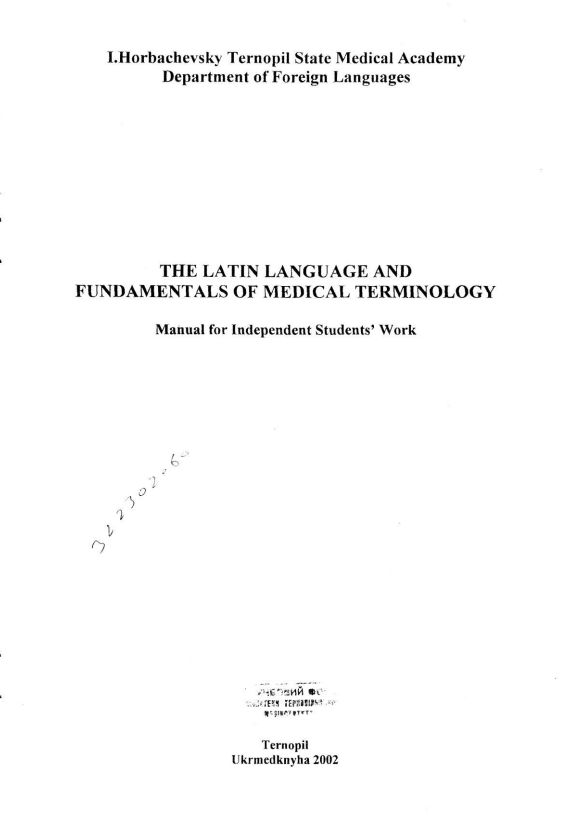LATIN PHRASEOLOGICAL FUND AS A SOURCE OF DEVELOPING FUTURE PHYSICIANS’ LEXICAL COMPETENCE
ФРАЗЕОЛОГІЧНИЙ ФОНД ЛАТИНСЬКОЇ МОВИ ЯК ДЖЕРЕЛО ФОРМУВАННЯ ЛЕКСИЧНОЇ КОМПЕТЕНЦІЇ МАЙБУТНІХ ЛІКАРІВ
| dc.creator | Kolodnytska, O. D. | |
| dc.creator | Palasiuk, H. B. | |
| dc.creator | Vorona, I. I. | |
| dc.date | 2020-04-01 | |
| dc.date.accessioned | 2020-07-03T09:14:18Z | |
| dc.date.available | 2020-07-03T09:14:18Z | |
| dc.identifier | https://ojs.tdmu.edu.ua/index.php/med_osvita/article/view/10991 | |
| dc.identifier | 10.11603/me.2414-5998.2020.1.10991 | |
| dc.identifier.uri | https://repository.tdmu.edu.ua/handle/123456789/15322 | |
| dc.description | The article reviews Latin proverbs and sayings, short quotes, statements of historical figures as a means of aphorism; it summarizes the importance of learning Latin aphorisms, quotes, proverbs and sayings and their corresponding equivalents in English and Ukrainian by medical students on Latin classes. According to historical conditions, Latin has lost its communicative function, but it has gained great historical and educational significance and has become an inexhaustible source of universal human culture and a link between antiquity and modernity. Learning Latin helps the deeper acquisition of knowledge from many specialties, and plays an important role in the artistic and aesthetic education of future physicians. Phraseological funds of many modern languages have been replenished by Latin and Greek aphorisms borrowed by new languages mainly through Latin. The Latin phraseological fund contains numerous proverbs and sayings borrowed by world’s languages in the translated form. Many Latin words were borrowed by Ukrainian, and it is not only the international terminological vocabulary used by scholars in various branches of knowledge but also everyday words (forum – форум (forum), colleague – колега (collega), professor – професор (professor), etc.). Latin is a basis of all medical terminology facilitating professional communication between languages. The study of Latin obviously helps future physicians to better understand and learn the medical terminology of Greek-Latin origin. Learning Latin not only introduces folk wisdom (learning of aphorisms, proverbs, and sayings), but also lays the foundations of scientific knowledge, promotes the formation of a professional language, which allows to carry out communicative tasks of medical staff. | en-US |
| dc.description | У статті розглянуто латинські прислів’я та приказки, короткі цитати, вислови історичних осіб як засіб афористики; узагальнено значення вивчення латинських афоризмів, цитат, приказок і прислів’їв на заняттях із латинської мови студентами-медиками та їх еквівалентів англійською та українською мовами. Історично склалося так, що латина втратила свою комунікативну функцію, але набула великого історичного та освітнього значення, стала невичерпним джерелом загальнолюдської культури та сполучною ланкою між античністю і сучасністю. Вивчення латинської мови допомагає більш глибокому засвоєнню знань iз багатьох спеціальностей i відіграє важливу роль у художньому та естетичному вихованні майбутніх медиків. Фразеологічні фонди багатьох сучасних мов поповнилися латинськими та давньогрецькими афоризмами, які були запозичені новими мовами переважно через латинську мову. Фразеологічний фонд латинської мови налічує численні прислів’я та приказки, що увійшли до складу багатьох мов світу у перекладній формі. Багато латинських слів увійшло і в українську мову, і це не тільки міжнародна термінологічна лексика, якою користуються науковці в різних сферах знань, а й ті слова, що ми вживаємо повсякденно (форум – forum (Latin: forum), колега – colleague (Latin: collega), професор – professor (Latin: professor) та ін.). Латинська лежить в основі всієї медичної термінології, сприяючи тим самим міжмовній професійній комунікації. Вивчення латинської мови не лише ознайомлює з народною мудрістю (вивчення крилатих висловів, прислів’їв та приказок), а й закладає основи наукових знань, сприяє засвоєнню медичної термінології греко-латинського походження майбутніми лікарями та формуванню професійного мовлення, що дозволяє виконувати комунікативні завдання медичного працівника. | uk-UA |
| dc.format | application/pdf | |
| dc.language | eng | |
| dc.publisher | Ternopil State Medical University | uk-UA |
| dc.relation | https://ojs.tdmu.edu.ua/index.php/med_osvita/article/view/10991/10492 | |
| dc.source | Medical Education; No. 1 (2020); 41-44 | en-US |
| dc.source | Медична освіта; № 1 (2020); 41-44 | uk-UA |
| dc.source | 2414-5998 | |
| dc.source | 1681-2751 | |
| dc.source | 10.11603/me.2414-5998.2020.1 | |
| dc.subject | Latin phraseological fund | en-US |
| dc.subject | Latin aphorisms | en-US |
| dc.subject | Latin proverbs | en-US |
| dc.subject | Latin quotes | en-US |
| dc.subject | medical students | en-US |
| dc.subject | future physicians | en-US |
| dc.subject | фразеологічний фонд латинської мови | uk-UA |
| dc.subject | латинські афоризми | uk-UA |
| dc.subject | латинські приказки | uk-UA |
| dc.subject | латинські прислів’я | uk-UA |
| dc.subject | студенти-медики | uk-UA |
| dc.subject | майбутні медики | uk-UA |
| dc.title | LATIN PHRASEOLOGICAL FUND AS A SOURCE OF DEVELOPING FUTURE PHYSICIANS’ LEXICAL COMPETENCE | en-US |
| dc.title | ФРАЗЕОЛОГІЧНИЙ ФОНД ЛАТИНСЬКОЇ МОВИ ЯК ДЖЕРЕЛО ФОРМУВАННЯ ЛЕКСИЧНОЇ КОМПЕТЕНЦІЇ МАЙБУТНІХ ЛІКАРІВ | uk-UA |
| dc.type | info:eu-repo/semantics/article | |
| dc.type | info:eu-repo/semantics/publishedVersion |
Files in this item
| Files | Size | Format | View |
|---|---|---|---|
|
There are no files associated with this item. |
|||

